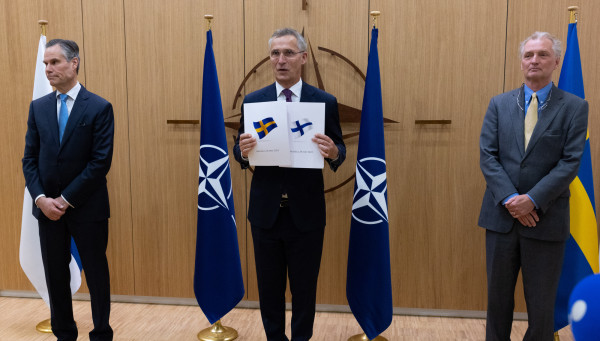One alternative is NATO with Sweden and Finland, but without Turkey
On May 18, NATO Secretary General Jens Stoltenberg officially received Finland and Sweden's application for accession. This is a historic event, because for almost two centuries (since 1815) Sweden was a neutral country. It was only in 1995, when Sweden joined the EU, that it lost its permanent neutrality. EU Member States have to follow a common EU policy, so EU Member States cannot be internationally recognized as permanently neutral countries. Until 2008, Sweden continued to pursue policies characteristic of neutral countries outside the common EU position.
In the wake of the Russia-Georgia war, Sweden took a further step away from neutrality by starting to cooperate with NATO. However, Russia's invasion of Ukraine and Putin's nuclear threat forced Sweden to abandon neutrality altogether.
Finland's neutrality does not have such a long history. Finland was an ally of Germany in World War II and was therefore one of the losers of World War II. However, by withdrawing from the war in 1944, Finland managed to avoid invasion and occupation by the Red Army. Finland agreed to cede part of its territory to the USSR, agreed to pay war reparations to the USSR and agreed to stay out of anti-Soviet blocs and military alliances. Neutrality was imposed on Finland. This was the price for avoiding becoming the 16th republic of the USSR. Finland respected neutrality for 77 years.
At the same time, however, Finland was prepared to defend its independence and, keeping in mind possible threats from the USSR and later from Russia, Finland maintained one of the best trained and equipped armies in Europe. Finland is a formidable military force with a very high defense potential that can do without the presence of NATO forces. That is why, even after the decision to join NATO, the Finnish Prime Minister, Sanna Marin, rejected the possibility of Finland placing nuclear weapons or opening NATO bases.
After the Russian invasion of Ukraine, both the Finnish and Swedish people chose to join NATO. This decision was welcomed and supported by the US President, the British Prime Minister, the Baltic and other European NATO member governments. However, the decision to expand NATO has to be unanimous - all 30 members have to agree. Unfortunately, President Recep Tayyip Erdoğan of Turkey, one NATO member, expressed his opposition to the membership of Sweden and Finland, accusing them of "supporting terrorism". One of the Turkish President's arguments is that Sweden and Finland have granted asylum to Kurds linked to the Kurdish separatist group, the Kurdistan Workers' Party, which is banned in Turkey, and have not put obstacles in the way of the activities of Kurdish non-governmental organizations. Like the US, Sweden and Finland are helping the Syrian Kurds, who are fighting both forces loyal to Syrian President Bashar al-Assad and the Turkish army fighting on Syrian territory.
Support for the Syrian Kurds was also one of the points of objection raised by the Turkish President.
Both the Swedish and Finnish leaderships are now pledging to engage in "constructive dialogue" with Turkey. However, it should be borne in mind that the Swedish and Finnish public is rather reserved towards the current rather authoritarian Turkish President. To force Finnish and Swedish societies to abandon democratic principles and values in order to indulge the demands of the authoritarian Erdoğan is mission impossible. In Turkey, the opposition that threatened Erdoğan's power has been destroyed, thousands of Erdoğan's political opponents have been imprisoned, and so on. In addition, Russia is currently circumventing Western sanctions through Turkey. Turkey is now becoming one of the most important channels for Russia to settle its imports, following the disconnection of its major banks from the SWIFT interbank payment system, etc.
US President Joe Biden promised that he would be able to persuade the Turkish President to withdraw the rejection. The US has the leverage to put pressure on Turkey. Turkey is currently experiencing a deep economic crisis. Turkey is an oil importer, so this year's energy crisis is a further blow to Turkey's already fragile financial system. If, on the other hand, the Turkish President does not make concessions, then this will show that Turkey is acting as an ally of Putin's Russia in the NATO alliance. Under these circumstances, the other NATO members will have to decide whether they want to remain in the same military bloc as Putin's ally. One alternative is NATO with Sweden and Finland, but without Turkey.
